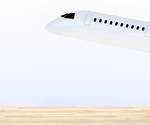Eva-Last bamboo composite building materials target coastal climates
Eco-friendly natural fiber range of decking, cladding, fencing, railing options ensure durable and long-lasting structures.
Eva-Last (Plano, Texas, U.S.) is a manufacturer and distributor of specialized building products made from eco-friendly bamboo fibers blended with recycled plastic, offering a range of decking, cladding, fencing, railing, architectural beams, fasteners and flooring. All options enhance structural longevity and durability and reduce maintenance while maintaining natural aesthetics, and are particularly geared toward coastal climate conditions.
Coastal environments are notorious for accelerating the corrosion of conventional steel reinforcements and finishes. Eva-Last’s offerings are reported to be highly resistant to saltwater corrosion, preventing damage from water, heat and humidity, thus extending the lifespan of decks, docks, beach or boathouses, patios, pergolas and promenade walkways, to name just a few. Cladding the façade of buildings or walls with a composite like VistaClad, for instance, — a weatherproof wood-look exterior hurricane tested against 100-kilometer-per-hour winds — can enhance exterior structures while extending its lifespan.
The company’s bamboo composite products are engineered to withstand other extreme conditions. They are resistant to UV radiation which can degrade, damage or discolor other materials such as wood or metal over time. Their inorganic composition also protects against damage or degradation from pests, moisture ingress or seasonal temperature fluctuations, ensuring stable, scratch-proof and strong structures that can remain functional and aesthetically pleasing with minimal upkeep.
All product ranges come in authentic timber tones and textures that complement and reflect the natural environment. Eva-Last offers fencing like Oasis and Evolver, capped bamboo composite decking options such as Infinity, Pioneer, Apex and Eva-tech, Hulk fasteners, Chain collated clips and more. The company reports that its composite profiles and complimentary systems can be found in more than 30 countries globally.
Related Content
-
Recycling end-of-life composite parts: New methods, markets
From infrastructure solutions to consumer products, Polish recycler Anmet and Netherlands-based researchers are developing new methods for repurposing wind turbine blades and other composite parts.
-
Bio-based acrylonitrile for carbon fiber manufacture
The quest for a sustainable source of acrylonitrile for carbon fiber manufacture has made the leap from the lab to the market.
-
TU Munich develops cuboidal conformable tanks using carbon fiber composites for increased hydrogen storage
Flat tank enabling standard platform for BEV and FCEV uses thermoplastic and thermoset composites, overwrapped skeleton design in pursuit of 25% more H2 storage.














